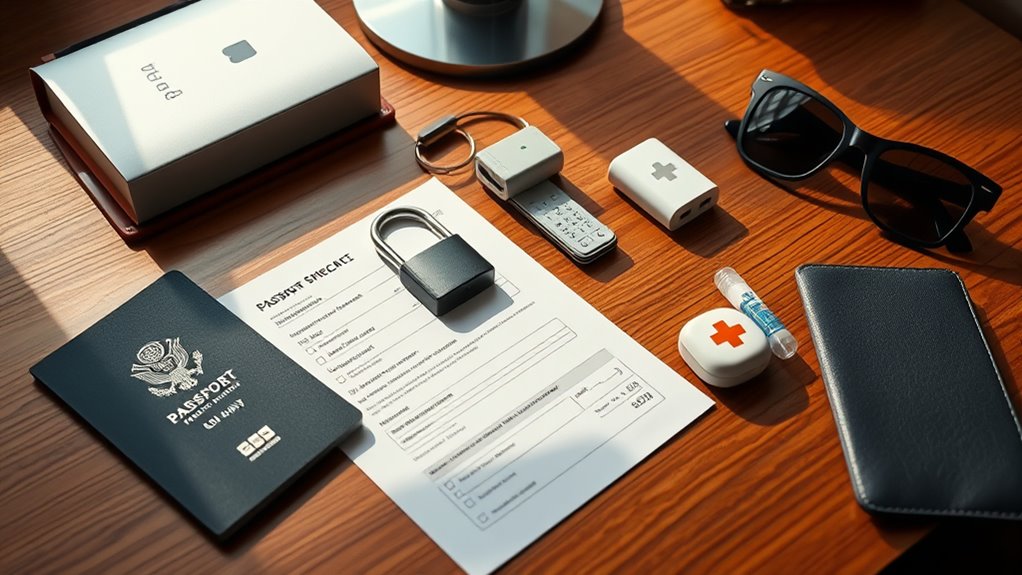Before your vacation, make sure your passport is valid for at least six months beyond your return date, and keep it in a secure yet accessible place. Get all-inclusive travel insurance that covers medical emergencies and cancellations, and carry proof of it. Secure valuables in hotel safes or lockable luggage while limiting cash and relying on cards. Stay connected with a local SIM or international roaming, and stay informed on safety alerts—this quick guide will help you prepare thoroughly.
Key Takeaways
- Verify passport validity extends at least 6 months beyond your return date and keep copies secure both physically and digitally.
- Obtain comprehensive travel insurance covering medical emergencies, cancellations, and lost belongings, and carry proof of coverage.
- Secure valuables using hotel safes or lockable luggage, limit cash, and stay aware of surroundings in crowded or unfamiliar areas.
- Check travel advisories, establish check-in routines with companions, and choose safe transportation options during your trip.
- Enable international communication, keep devices charged, and share your travel plans with trusted contacts for quick assistance.

Traveling can be exciting, but ensuring your safety requires careful planning. Before you jet off, it’s essential to double-check your passport safety. Make sure your passport is valid for at least six months beyond your planned return date, as many countries require this for entry. Keep your passport in a secure, easily accessible location, like a travel wallet or a front pocket, to prevent theft or loss. Consider making digital copies of your passport and storing them securely online or on a separate device. This way, if your physical passport is lost or stolen, you’ll have the necessary documentation to get a replacement quickly.
Ensure your passport is valid for six months beyond your trip and keep digital copies for easy access.
Alongside passport safety, securing comprehensive travel insurance should be a top priority. Travel insurance can cover a range of issues, from medical emergencies to trip cancellations, giving you peace of mind on your journey. Review your policy carefully; ensure it includes coverage for medical expenses, emergency evacuations, and lost luggage. Confirm that your policy applies to your destination, especially if you’re traveling to areas with higher risks or limited healthcare facilities. Carry proof of your insurance policy, either printed or digital, so you can access it easily if needed. This small step can save you significant stress and money in an emergency.
Beyond protecting your documents and insurance, consider the security of your belongings throughout your trip. Use hotel safes or lockable luggage to secure valuables when you’re not using them. Be cautious when carrying cash—prefer cards or digital payments to minimize theft risks—and always stay aware of your surroundings, especially in crowded places. When steering through unfamiliar areas, research safe routes and avoid poorly lit or isolated streets at night. Keep a list of emergency contacts, including local authorities and your country’s embassy or consulate, in case you need assistance.
It’s also wise to stay connected and informed. Enable international roaming or purchase a local SIM card to stay in touch with family and friends. Check for any travel advisories or safety alerts related to your destination before departure. If you’re traveling with others, establish a plan for checking in regularly and sharing your whereabouts.
Frequently Asked Questions
How Can I Protect My Digital Devices Abroad?
To protect your digital devices abroad, verify your devices are encrypted with strong passwords and enable device encryption to safeguard your data. Use app security features like two-factor authentication and avoid downloading untrusted apps. Keep your software up to date to patch vulnerabilities. Additionally, turn off Bluetooth and Wi-Fi when not in use, and use a VPN to secure your internet connection. These steps help keep your information safe during travel.
What Travel Insurance Coverage Should I Consider?
Think of travel insurance as your safety net in a high-wire act. You should consider a policy that covers travel medical expenses, ensuring you’re not caught off guard by sudden illness or injury. Be vigilant about policy exclusions, so you don’t get blindsided. Look for all-encompassing coverage that includes emergency medical evacuation, trip cancellations, and lost belongings. It’s your insurance against life’s unexpected tumbles, keeping you secure amidst the adventure.
How Do I Secure My Valuables During Excursions?
To safeguard your valuables during excursions, follow travel safety tips like using a lockable, theft-proof bag and keeping it close. Avoid flashy jewelry and unnecessary electronics to reduce theft risk. Use luggage security measures such as padlocks or cable ties on your bags, and consider a money belt or hidden pouch for cash and important documents. Stay alert and aware of your surroundings to prevent theft and ensure your valuables stay safe.
What Emergency Contacts Should I Have Accessible?
You should have your contact info for local emergency services, your country’s embassy or consulate, and trusted contacts readily available. Keep a printed and digital copy of your emergency plan, including medical info and evacuation procedures. Share this info with someone at home and keep it in a secure, easily reachable spot during your trip. Being prepared ensures you can act quickly if an emergency arises.
How Can I Prevent Travel Scams and Theft?
Picture yourself enjoying a sunny getaway, but stay alert to prevent scams and theft. Keep your valuables close and avoid flashy displays of wealth. Use RFID-blocking wallets to shield against identity theft and monitor your credit card activity regularly to spot fraud early. Be cautious with public Wi-Fi, and don’t share sensitive info. These steps help you dodge travel scams, protect your belongings, and ensure your trip stays memorable for the right reasons.
Conclusion
By following this security checklist, you’re more prepared to enjoy your vacation worry-free. Remember, over 60% of travelers have experienced some form of theft or loss abroad, highlighting the importance of staying vigilant. Keep your valuables secure, stay aware of your surroundings, and double-check your plans before departure. With these tips, you’ll reduce risks and create lasting memories, confident that your safety is in your hands. Travel smart, stay safe, and make the most of your trip!









